Spotlight on “pescaturismo”: How bringing tourism into their business helps small-scale fishers protect their livelihoods and their fish
.png)
Sardinia is known for its crystalline waters, stunning views and seafood specialities. Visitors now have the chance to enjoy all three at once while experiencing first-hand the traditions of one of the island’s oldest industries: fishing. For the past seven years, Davide Stacca and Silvia Pazzola have been inviting clients aboard “Alex”, their 11-m fishing boat, on coastline tours around the island of Asinara, off north-western Sardinia, that include stops to haul in their octopus and red crab traps, swim in turquoise coves and feast on the day’s catch.
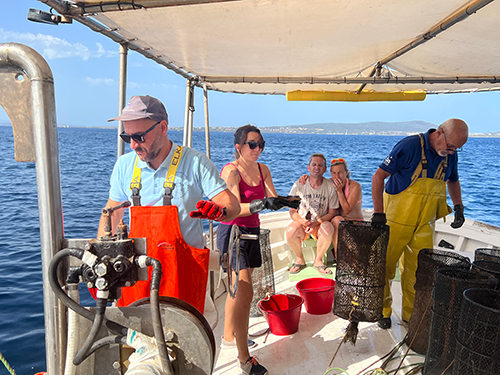
Davide Stacca, Silvia Pazzola and Antonio Iacomini demonstrating fishing operations during a pescaturismo tour off the Asinara Island, Sardinia ©GFCM/Dominique Bourdenet
“Pescaturismo”, a phrase combining the Italian words for fishing and tourism, is based – like its dryland cousin “agriturismo” – on savouring the beauty and simple pleasures of a time-honoured and sustainable lifestyle. Passengers take part in a centuries-old local value chain that responsibly feeds communities and stewards marine resources. For the fishers, pescaturismo provides alternative income opportunities while allowing them to fish less, thus relieving pressures on fish stocks, keeping small-scale fisheries viable and attracting younger generations to the sector.
“Pescaturismo is a way to diversify [our business] and to introduce people to an ancient trade that is unfortunately disappearing among young people,” said Silvia. Its purpose is indeed as much educational as it is recreational or economic. “What we like is contact with the people, especially showing young people the world of fishing and introducing people to sustainability,” added Davide.
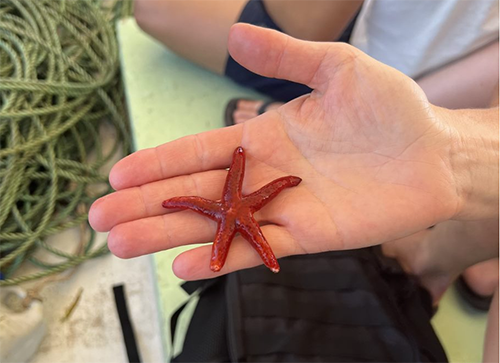
Pescaturismo offers a hands-on lesson in marine wildlife ©GFCM/Dominique Bourdenet
Davide and Silvia’s boat is one of 71 400 small-scale fishing vessels in the Mediterranean and the Black Sea, which account for 83 percent of the region’s total fleet. Characterized by small production units, limited technology and low capital investment and often managed by families, small-scale fisheries represent a socio-economically crucial sector that requires support in the face of numerous challenges. Pollution, climate change, and illegal fishing threaten marine ecosystems, while the COVID-19 pandemic and its after-effects have posed challenges for market access for many fishers.
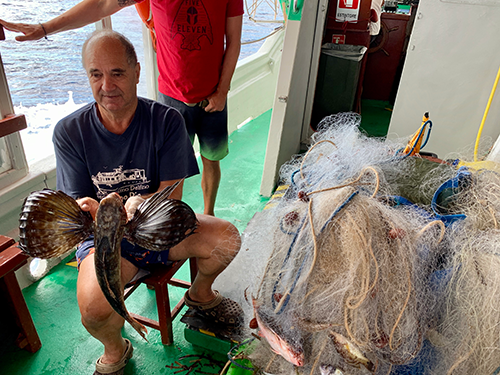
The wide variety of Mediterranean fish species are on display on a pescaturismo trip ©GFCM/Dominique Bourdenet
To respond to these threats, the GFCM recommends effective measures and seeks to provide useful resources to protect the livelihoods of small-scale fishers through the Regional Plan of Action for Small-Scale Fisheries in the Mediterranean and the Black Sea (RPOA-SSF), a ten-year political commitment that encourages increasing fishers’ representation in management and decision-making processes. This year, FAO celebrates the International Year of Artisanal Fisheries and Aquaculture (IYAFA 2022), proclaimed by the United Nations in order to enhance global awareness about the sector and strengthen its capacity to enhance sustainability as well as the social development and well-being of the people depending on it.
Safeguarded by national park status and surrounded by a marine protected area (MPA), Asinara offers the ideal conditions for pescaturismo to succeed. Customers are plentiful as tourists flock to the island throughout the summer to enjoy its many comforts and fabulous landscape and wildlife, while healthy marine ecosystems ensure fresh catch is reliable. In fact, what began as an entrepreneurial experiment led by young innovators like Silvia and Davide – who founded their company in their 20’s – now includes many fishers in the ports near Asinara. “I think that it’s the place where the activity of pescaturismo is practiced the most in all of Italy,” says Silvia. The World Wide Fund for Nature recently described Asinara as a “pioneering community” in pescaturismo.
The additional income earned from pescaturismo over the summer allows Silvia, Davide and their colleagues to reduce their fishing effort, which in turn alleviates some of the stress on fish stocks. Pescaturismo benefits both the environment and people through a regenerative cycle, and it does not ask fishers to learn new trades or change careers.
Silvia and Davide’s daily summer schedule involves first collecting their catch of octopus, red crab and other species from their traps laid on previous fishing trips before lowering the traps back into the water for the next. As they empty their traps, Davide and a crew member, Antonio Iacomini, hold the specimens up for the passengers to admire while Silvia describes the different species and the techniques used. If a specimen is undersized, it must be tossed back into the water to give it the chance to mature to reproductive age and help sustain its population, Silvia explains. The boat then motors to quiet coves where passengers can choose to swim or explore the coastline as Silvia prepares a seafood pasta and octopus salad in the galley for their return.
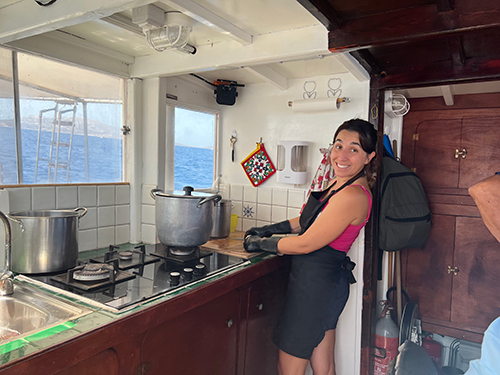
Silvia prepares traditional recipes onboard using the fresh catch of the day ©GFCM/Dominique Bourdenet
When Dominique Bourdenet, Knowledge Management Officer at the GFCM, spent a few days on holiday near Asinara this summer, she couldn’t pass up the opportunity to see pescaturismo in action. She described her day aboard Davide and Silvia’s boat with about a dozen other tourists as “a close-to-nature experience where you can discover the sea not simply as a tourist but through the eyes of small-scale fishers, sharing their everyday life and learning, while enjoying a day at sea in a convivial atmosphere.” She added: “It was a genuine and enriching experience both from a human and professional point of view”.
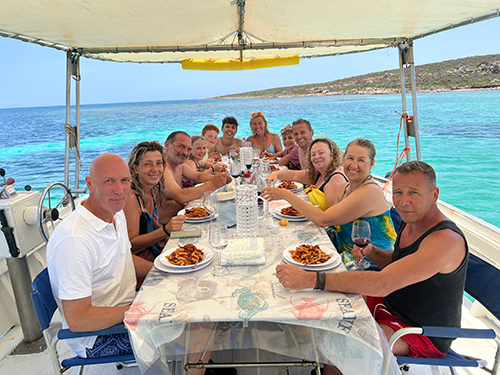
Eating the day’s fresh catch is another important part of a pescaturismo trip ©GFCM/Dominique Bourdenet
Pescaturismo offers a flexible extension to small-scale fishing operations. “I think pescaturismo can be done everywhere, in all Italian ports,” says Silvia. Indeed, every Italian coastal region already boasts at least a few boats practicing pescaturismo, and initiatives to promote the industry are also spreading across the Mediterranean region. The FAO Blue Hope Project, for example, encourages and supports fishers in synergizing their work with the tourism sector in three coastal areas of Türkiye, Algeria and Tunisia.
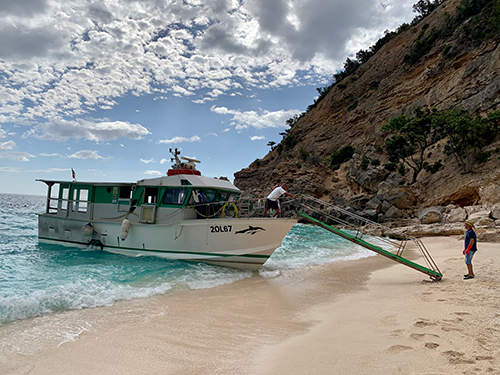
Pescaturismo boat at Cala Mariolu, Gulf of Orosei, Sardinia ©GFCM/Dominique Bourdenet
In Asinara and elsewhere, fishers have seen the utility and rewards of pescaturismo and have begun to embrace the new idea. More importantly, young people, whether locals or visiting passengers, are learning about the sea, its beauty and value, and its opportunities.
